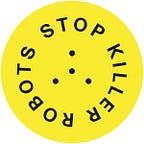Humanitarian disarmament as a means of promoting peace in the era of technological transition
by Hevelyn Priciely Ghizzi
The United Nations (UN) Disarmament Week, observed from 24–30 October, seeks to promote awareness and better understanding of disarmament issues and their cross-cutting importance. Young people have an important role to play in the promotion of disarmament as a method to protect people from harm and to build safer and more peaceful societies.
In honour of this important week, members of the Stop Killer Robots Youth Network were asked to share their thoughts on the themes of disarmament and autonomous weapons systems. Disclaimer: The blogs in this series do not necessarily constitute the opinions of Stop Killer Robots. Nor should they be considered the opinions and views of all Stop Killer Robots members.
The world is living through an era of technological transition, in which weapons are being produced using advanced technologies and complex systems that place the paradox of arms control and the capacity to destroy life at an all-time high.
The 24th of October marks the start of UN Disarmament Week. Many countries have pursued disarmament as a key to a peaceful and more protected world. However, it is worth noting, that throughout history disarmament was seen as a way of weakening and destabilizing states. As advances in science and technology continue to revolutionize human life, artificial intelligence could be used to develop autonomous systems capable of identifying people, selecting targets and applying force without human intervention. The advancement and widespread adoption of these technologies have the capacity to bring about substantial alterations in the conduct of warfare, leading to increased global instability and heightened tensions among nations.
The discussion in this relevant week goes beyond just promoting disarmament or a legal instrument to prohibit or limit these weapons, but the implementation of humanitarian disarmament instead of strategic disarmament. The strategic disarmament correlated with the war industry creates an insecure and turbulent world, where human beings are just numbers, and their objectification takes away their right to life.
Adding to this, allowing machines to target individuals causes great dehumanization, since they could attack people without human control. According to the International Committee of the Red Cross, an autonomous weapon is triggered by sensors and software that match what the sensors detect in the environment with a “target profile”. In other words, the functioning of the weapons is reversed, so that it is the victim themself, when they move, who triggers the data and firing system.
After the Second World War and the testing of nuclear weapons, the concepts surrounding peace and disarmament began to receive more attention. According to Cortright, “Peace is more than the absence of war,” and to Howard, it is also “the maintenance of an orderly and just society,”. Therefore, simply not waging war does not mean that people are at peace as previous wars have already left concrete humanitarian and environmental impacts.
Peace, as well as disarmament, appear as a hiatus from the thinking that prevailed until 1945, assuming that peace was not merely a contingent state achieved by military victories between inevitable wars, but was defined on its own merits as a process that could be built through policies and interventions aimed primarily at affirming people’s lives and producing a better, more equal and just world, free from direct and indirect manifestations of violence. Peace studies proposed a break with traditional thinking, rejecting the maxim “if you want peace, prepare for war” and putting in its place another equally radical notion: if you want peace, prepare for peace.
Furthermore, it is worth saying that humanitarian disarmament differs from strategic thinking in that it focuses on concretely tackling humanitarian impacts and includes civil society in its discussions, with greater transparency in the negotiation and implementation processes.
In a world where machines are beginning to have the power to choose, we can see how the technological age is already being felt. According to Stop Killer Robots, “autonomy in weapons systems is a profoundly human problem. Killer robots change the relationship between people and technology, handing over life and death decisions to machines,”. Furthermore, the loss of meaningful human control demonstrates that weapons users are no longer fully engaged with the consequences of their actions. Nevertheless, for International Humanitarian Law and humanitarian disarmament, the mere existence of weapons is already a threat to life, regardless of the quantity, which generates a risk to national and international security. When weapons could be programmed to have decision-making power, they could become even more lethal.
Therefore, the only way to achieve and promote peace in order to reduce human deaths from conflicts is by advocating against killer robots and the development of equipment that dehumanizes and turns human beings into mere numbers. Disarmament efforts should be driven by the humanitarian imperative to shield the civilian population from the intolerable consequences resulting from the potential deployment of autonomous armaments, rooted in the notion of ‘human security’, which prioritizes the safeguarding of individuals.
Hevelyn Ghizzi is an undergraduate student in International Relations and Integration at Federal University of Latin-America Integration (UNILA), administration technician, fellow of the Friendly Universities Program: welcoming Ukrainian scientists through Western Paraná State University — Unioeste, volunteer in the Humanitarian Disarmament Research Project: International political and legal challenges through UNILA, Member of the Mine Action Fellows Program, Member of DHESARME — Brazilian Action for Humanitarian Disarmament, Public Image of Rotaract Foz do Iguaçu M’Boicy — Rotary International.
